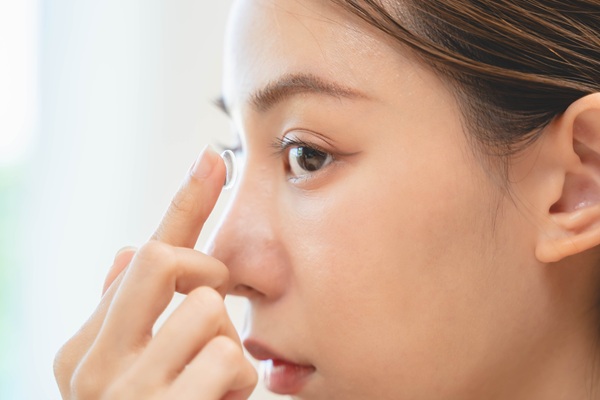Three Tips for Choosing Eyeglasses

The right set of eyeglasses corrects your vision and does not interfere with everyday activities like working on a computer or having fun with friends and family members outdoors. Poor vision impacts all aspects of your life, from your ability to read street signs to being able to identify people you know in a crowd.
About 60 percent of people in the U.S. need contact lenses to correct their eyesight, and eyeglasses are typically recommended even if you plan to wear contacts most of the time.
Selecting the right eyeglasses for you
Eyeglasses help to correct a person’s vision, and they also complement their style and appearance. Here are three important things you should be looking at when shopping for a set of eyeglasses:
Make sure it suits your lifestyle
One of the first things anyone shopping for a set of eyeglasses should go over is if the lenses and frames they are looking at fit their lifestyle. A person who spends a large portion of their time working at a physically demanding job, sports, or exercising would be better off with a lightweight, durable set of eyeglasses.
Metallic frames are a great option for those looking for durable, lightweight frames. So are materials like titanium or Flexon. The latter is arguably the best option for active people since it is almost as durable as metal, lighter, and resistant to corrosion and rust. Some plastic frames are also durable enough for active lifestyles like those made from nylon.
Consider how it fits the shape of your face
Eyeglasses are not one-size-fits-all. The shape of a person’s face affects how good a set of eyeglasses looks on them and how well it fits. People with round faces tend to lack angles and edges, so frames that add more definition to their round faces tend to look best on them. Rectangular or slightly angular frames are great for round faces.
A person with a square-shaped face should consider frames than tone down their strong jawline and forehead. Minimalistic, rounded, or rimless frames work well for such faces.
People with oval faces tend to have the easiest time when it comes to selecting the right set of eyeglasses. Since these people have both curves and angles on the face, almost any type of glasses looks good on a person with an oval face.
Last but not least are heart-shaped faces. These people tend to have a narrow chin, wider forehead, and higher cheekbones. Rounded, rimless frames tend to suit these faces.
Find the right color
The color of a person’s eyeglasses also affects the way it makes them look. Finding the right color for your frames is quite easy if you focus on the tone of your face. Yellow, dark beige, and browns are great for people with warm lighter skin tones. Grays, pinks, purples, greens, and blues work well for those with darker tones.
Frequently asked questions about correcting vision with eyeglasses
We go over the answers to some frequently asked questions about correcting your vision with eyeglasses:
1. How do eyeglasses correct vision?
Eyeglasses work by bending the light that enters your eyes. This is because eyeglasses put a curve on the lens, which helps the eye to focus light in the right spot on the retina, at the back of the eye.
2. What are the different types of eyeglasses?
There are three main types of eyeglasses: single vision, bifocals, and trifocals. Single vision eyeglasses correct for nearsightedness or farsightedness. Bifocals add a second correction to single vision glasses, usually for presbyopia, which is age-related farsightedness. Trifocals add a third correction, usually for astigmatism.
3. What are the different types of lenses?
There are four main types of lenses: glass, plastic, polycarbonate, and high-index. Glass lenses are the least expensive, but they are also the heaviest. Plastic lenses are lighter than glass, but they can scratch more easily. Polycarbonate lenses are made from a very strong and shatter-resistant type of plastic. High-index lenses are made from materials that allow them to be thinner and lighter than other types of lenses.
4. What kind of frame should I choose?
The kind of frame you choose is mostly a matter of personal preference. However, there are some things you should keep in mind when choosing a frame. For example, if you have a strong prescription, you may want to choose a larger frame so that the lenses will be big enough to correct your vision. You should also consider the material of the frame. Metal frames are usually more durable than plastic frames, but they can also be more expensive.
5. What is an anti-reflective coating?
An anti-reflective (AR) coating is a thin film that is applied to the surface of your lenses. It helps to reduce glare and makes it easier for people to see your eyes. AR coatings can also help to protect your eyes from harmful blue light.
We have the right eyeglasses for you
Choosing the right set of eyeglasses becomes easy when you know what to focus on. Give us a call or visit our Dallas clinic and our optometrist will help you find the right frame and lenses for you.
Request an appointment here: https://www.texasoptical.net or call Texas Optical at (214) 771-7333 for an appointment in our Dallas office.
Check out what others are saying about our services on Yelp: Read our Yelp reviews.
Recent Posts
For those living with diabetes, undergoing a diabetic eye exam is one of the most important steps in protecting their vision and overall eye health. High blood sugar levels can lead to a range of complications, including conditions that damage the eyes over time. These exams help detect these issues before they become serious, allowing…
Contact lenses provide clear vision and convenience for individuals who prefer an alternative to eyeglasses. However, proper care and maintenance are essential to prevent infections, irritation, and eye damage. Neglecting hygiene practices can lead to serious eye conditions, including corneal ulcers and keratitis. Understanding how to clean, store, and handle contact lenses ensures long-term eye…
Maintaining eye health and preventing long-term issues is the result of consistent and quality vision care. Many people focus on overall wellness but may overlook daily habits that support healthy eyesight. However, taking simple steps each day can protect vision, reduce eye strain, and prevent future complications. By making eye health a priority, it is…
Prescription contacts provide vision correction, comfort, and convenience for those who do not want to wear glasses. However, caring for and wearing contacts takes some getting used to. Learning to insert, remove, and maintain them will help ensure a comfortable and safe experience.Not all contact lenses are the same, and choosing the right pair is…


